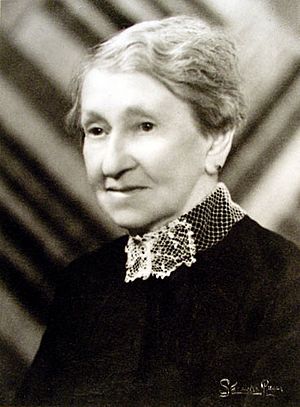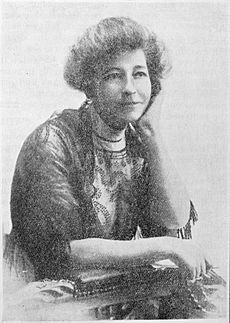Ada Wells facts for kids
Ada Wells (born Ada Pike, 29 April 1863 – 22 March 1933) was a New Zealander who worked hard for women's rights and helped her community. She was a teacher, a social worker, and a leader in the movement for women to get the right to vote.
Contents
Ada Wells' Life Story
Ada Pike was born in England, near a town called Henley-on-Thames. When she was ten years old, in 1873, her family moved to New Zealand. They arrived in Lyttelton on a ship called the Merope.
Ada went to school at Avonside School and then Christchurch West High School. After finishing school, she worked as a pupil-teacher from 1877 to 1881. This meant she taught younger students while still learning herself.
She also studied at Canterbury College. In 1884, when Ada was 20, she married Harry Wells. He was the organist and choirmaster at the cathedral. Ada believed strongly that women should be able to earn their own money and be independent.
Ada taught at St. Albans School, which was in a part of Christchurch where many working-class families lived. She was very dedicated to her students. In 1892, Ada was dismissed from her teaching job. This experience made her even more determined to fight for fairness for women.
Fighting for Women's Rights
Ada Wells was a key figure in the movement for women to gain the right to vote. This movement is called women's suffrage.
The Right to Vote
In the 1880s, Ada was very active in the Women's Christian Temperance Union New Zealand (WCTU NZ). This group worked to get women the right to vote. While Kate Sheppard was well-known for leading the public campaign, Ada was a great organiser behind the scenes.
Thanks to the hard work of many people like Ada, New Zealand made history in 1893. It became the first self-governing country where all women could vote in national elections.
Leading Women's Groups
In 1892, Ada started the Canterbury Women's Institute. This group was similar to other women's rights groups around the country. She was the president of this institute for many years.
In 1896, the National Council of Women of New Zealand was formed. This was a big step for women's rights in New Zealand. Ada Wells became its very first secretary.
From 1899 to 1906, Ada was an elected member of the Ashburton and North Canterbury United Charitable Aid Board. This board helped people in need. She also worked with the Prison Gate Mission, which helped people who had been in prison get back on their feet.
Ada and her husband had three daughters and one son. Harry Wells passed away in 1918. Ada Wells died in Christchurch on 22 March 1933. She was buried at the Waimairi Cemetery.
Today, the Ministry for Culture and Heritage offers an Ada Wells Memorial Prize for university students. This prize honours her important contributions.
Ada Wells' Other Activism
Ada Wells was also involved in other important causes. She believed in peace and helping others.
Peace and Social Justice
As a member of the National Peace Council, Ada spoke out against war. She also helped conscientious objectors during World War I. These were people who refused to fight in the war because of their beliefs.
Ada also campaigned for women to have the right to become Members of Parliament. This right was given to women in 1919. However, it wasn't until 1933 that the first woman was elected to Parliament.
Christchurch City Council
Ada Wells was a member of the Labour Party. Between 1917 and 1919, she made history again. She became the first woman to be a member of the Christchurch City Council. This was a very important step for women in local government.
See also
 In Spanish: Ada Wells para niños
In Spanish: Ada Wells para niños
- List of suffragists and suffragettes
- Timeline of women's suffrage
- Women's suffrage in New Zealand
 | James Van Der Zee |
 | Alma Thomas |
 | Ellis Wilson |
 | Margaret Taylor-Burroughs |



